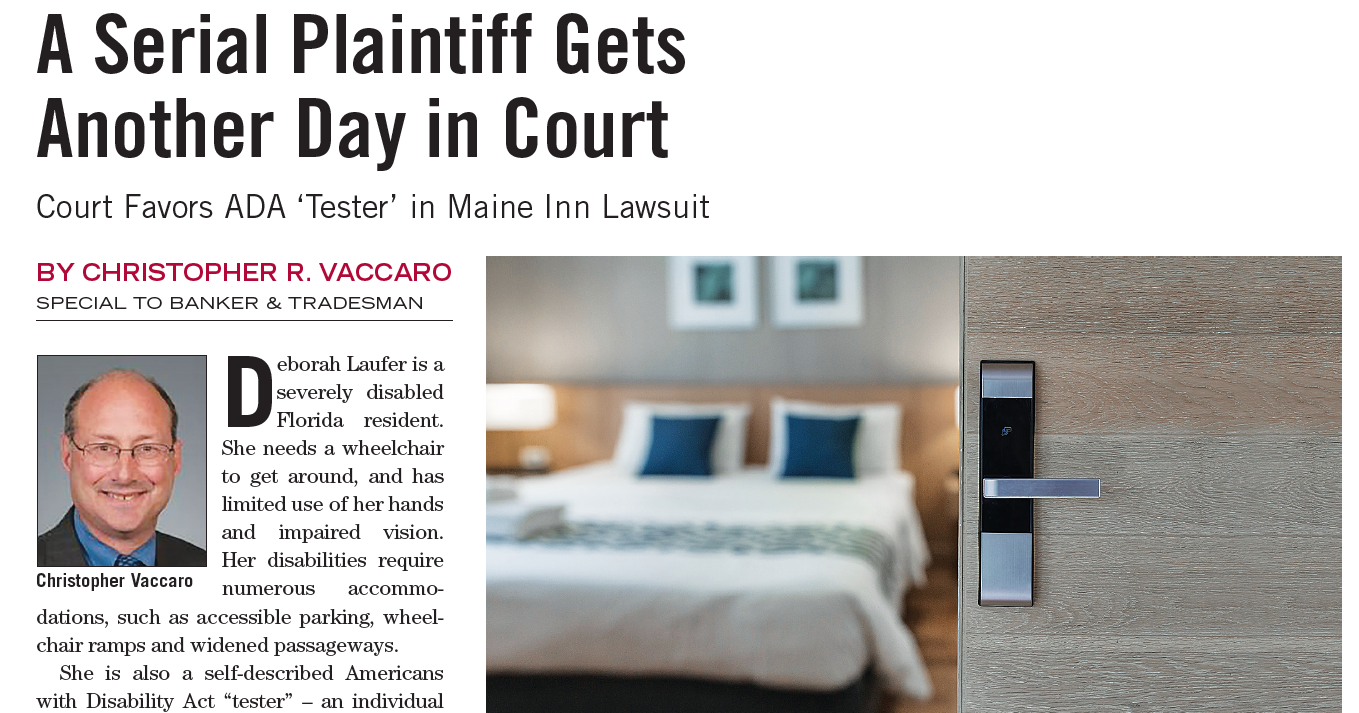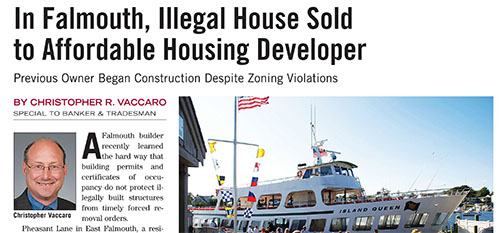 Court Favors ADA “Tester” in Maine Inn Lawsuit
Court Favors ADA “Tester” in Maine Inn Lawsuit
By Christopher R. Vaccaro
Special to Banker & Tradesman
Deborah Laufer is a severely disabled Florida resident. She needs a wheelchair to get around, and has limited use of her hands and impaired vision. Her disabilities require numerous accommodations, such as accessible parking, wheelchair ramps and widened passageways.
She is also a self-described Americans with Disability Act “tester” – an individual who seeks out businesses that are noncompliant with the ADA and its regulations, but does not intend to actually use the businesses’ services.
Under the ADA, “no individual shall be discriminated against on the basis of disability in the full and equal enjoyment … of
any place of public accommodation by any person who owns … or operates a place of public accommodation.”
Hotels are public accommodations subject to this law. ADA regulations require that hotel reservations systems describe accessible features in hotel facilities “in
enough detail to reasonably permit individuals with disabilities to assess independently whether a given hotel or guest room meets his or her accessibility needs.” These regulations are designed to help disabled individuals efficiently determine from hotel online reservation systems whether a hotel can accommodate them.
Surfing for Online Violations
Whether testers like Laufer have “standing” to file lawsuits is a threshold issue in discrimination cases. Courts developed the standing doctrine to ensure that plaintiffs
have concrete injuries, and that they are not merely concerned bystanders seeking to vindicate their value interests. In order to have such standing, plaintiffs must suffer actual injury, traceable to the defendants’ misconduct, which can be redressed by the courts.
Plaintiffs without standing cannot maintain lawsuits, and courts must dismiss their cases. In 1982, the United States Supreme Court ruled in Havens Realty Corp. v. Coleman that a Black tester had standing to sue a real estate company that refused to show her available housing. However, many federal courts have dismissed ADA lawsuits filed by serial testers, ruling that the testers lack standing.
Laufer surfs the internet looking for hotels nationwide whose online reservation systems lack information on accessibility. When she finds them, she engages lawyers
to sue hotel operators in federal court for ADA violations, seeking declaratory judgments, injunctive relief and attorney’s fees. The ADA does not allow private parties to collect monetary damages, but it does require violators to pay their attorney’s fees, thus creating a lucrative industry for lawyers that work with testers like Laufer. With such lawyers’ assistance, Laufer has filed over 650 lawsuits involving non-compliant ORS.
Some federal courts have ruled that Laufer lacks standing to maintain her lawsuits. But she persists, despite occasional setbacks.

Who Has Standing?
In 2020, she discovered that the online reservation system for the Coast Village Inn and Cottages of Wells, Maine lacked information on accessibility. She filed suit in the federal court in Maine, claiming that the inn’s online reservation system caused her “humiliation and frustration at being
treated like a second-class citizen.” The district court dismissed her suit, ruling that she lacked standing to sue the inn because, as an ADA tester, she did not suffer an actual injury, and no injury to her was imminent.
Last month, the U.S. Court of Appeals for the First Circuit, which hears federal appeals from Maine, Massachusetts, New Hampshire and Rhode Island, overruled the Maine federal district court. While acknowledging the division among federal appeals courts on Laufer’s standing to file suits as an ADA tester, the First Circuit appeals court ruled that Laufer had standing to sue the Maine inn.
The appeals court acknowledged Laufer’s claim that the inn’s online reservation system lacked accessibility information required by ADA regulations. This denial of information to Laufer, a disabled individual, was actionable under the ADA. Laufer’s status as a tester, with no intent to actually use the accessibility information, did not change this. The deficient reservation system
caused Laufer a concrete injury, because the lack of information put her “on an unequal footing to experience the world in the same way as those who do not have disabilities.” For these reasons, the First Circuit appeals court reversed the district court’s judgment, allowing Laufer’s lawsuit to proceed.
Because of the split among federal appeals courts on ADA testers’ standing, the U.S. Supreme Court may eventually decide this issue. For now, hotels and inns, especially those located in Maine, Massachusetts, New Hampshire and Rhode Island, should make sure their websites and reservations systems, including those operated by outside services, disclose the availability of accommodations for disabled individuals. They should also spread the word that testers like Laufer are out there looking to start lawsuits when they discover violations of ADA regulations.
Download the article as seen in Banker & Tradesman on October 31, 2022. Learn more about Christopher R. Vaccaro.



